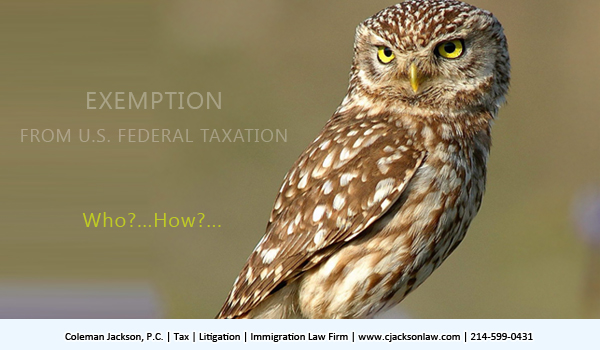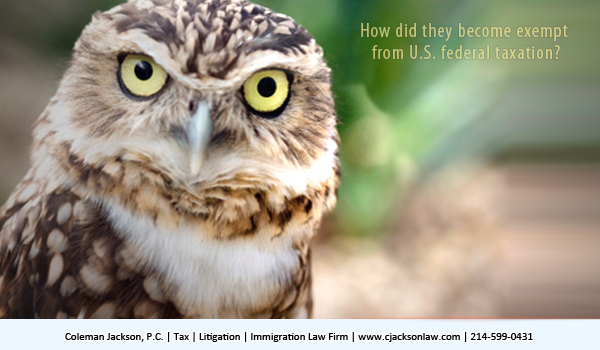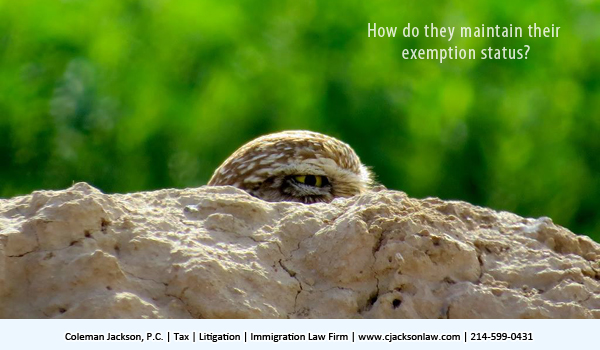By Coleman Jackson, Attorney, CPA
March 18, 2017
Who is exempt from U.S. Federal Taxation? How did they become exempt? How do they maintain their exemption status? We will attempt to answer these three questions in this blog. But first, it must be clearly understood that exemption from U.S. federal taxation is a special privilege under U.S. federal tax laws because the general rule is a U.S. citizen or resident of the United States must file a federal tax return reporting their gross income unless they can be claimed as a dependent on another taxpayer’s return. The terms U.S. citizen or resident are not limited to natural people, these terms also can include, legal fictions, such as, corporations, partnerships, agencies and other types of entities created under international, federal, state and local laws. United States tax law at, 26 U.S.C.S §61, generally defines gross income as all income from whatever source derived, including (but not limited to) the following items:
- Compensation for services, including fees, commissions, fringe benefits, and similar items;
- Gross income derived from business;
- Gains derived from dealings in property;
- Interest;
- Rents;
- Royalties;
- Dividends;
- Alimony and separate maintenance payments;
- Annuities;
- Income from life insurance and endowment contracts;
- Pensions;
- Income from discharge of indebtedness;
- Distributive share of partnership gross income;
- Income in respect of a decedent; and
- Income from an interest in an estate or trust.
This gross income list is not exhaustive, which means, gross income can arise out of other types of transactions or economic events that exist today or may exist in the future. What is difficult for many immigrants to the United States (and also many Americans born here) to understand is that the United States federal tax laws reaches to the ends of the earth; meaning, U.S. citizens and residents are required to file federal tax returns reporting their worldwide income regardless of where they reside in the world and regardless of where their income was earned in the world. We have talked about these concepts and effects of international tax treaties in past blogs, if you are interested in knowing more about this; visit our blog site and google. We will not focus on this in detail in this particular blog. As stated in the opening of this blog, we want to explore three questions regarding exemption from U.S. federal taxation in this blog as follows:
- Who is exempt from U.S. federal taxation?
- How did they become exempt from U.S. federal taxation?
- How do they maintain their exemption status?
The phrasing of these questions reminds me of an Owl… the Who How.
Who is Exempt from U.S. Federal Taxation?
The Internal Revenue Code: 26 U.S.C.S. §§501 and 401 sets forth the organizations that are exempt from federal taxation unless the exemption is denied by the U.S. Treasury (IRS), and application of §502 or §503. The scope of the exemption is discussed further below. In general terms (what we mean by this term is that we are discussing these matters in very general terms since tax law is complex)… there are many, many conditions, effective dates and other provisions that could apply to this generalized list of exempt organizations. The list of organizations that are exempt under §501(c) are as follows:
- Any corporation organized under an Act of Congress which is an instrumentality of the U.S.;
- Any corporation organized for the exclusive purpose of holding title to property, collecting income and turning the entire collected amount less expenses to an organization that is exempt under §501(c);
- Any corporation, and any community chest, fund, or foundation, organized exclusively for religious, charitable, scientific, testing for public safety, literary, or educational purposes, or to foster national or international amateur sports competition (but only if no part of its activities involve the provision of athletic facilities or equipment), or for the prevention of cruelty to children or animals, no part of the net earnings of which inures to the benefit of any private shareholder or individual, no substantial part of the activities of which is carrying on propaganda, or otherwise attempting, to influence legislation (except as otherwise provided in subsection (h), and which does not participate in, or intervene in (including the publishing or distributing of statements), any political campaign on behalf of (or in opposition to) any candidate for public office.
- Civic leagues or organizations not organized for profit but operated exclusively for the promotion of social welfare, or local association of municipal employees where net earnings are devoted exclusively to charitable, educational or recreational purposes;
- Labor, agricultural, or horticultural organizations;
- Business leagues, chambers of commerce, real-estate boards of trade, or professional football leagues organized as non-profits and whose earnings never in anyway inure to the benefit of any private shareholder;
- Clubs organized for pleasure, recreation, and other nonprofitable purposes, substantially all of the activities of which are for such purposes and no part of the net earnings of which inures to the benefit of any private shareholder;
- Fraternal beneficiary societies, orders, or associations operating under the lodge system and providing for the payment of life, sick, accident, or other benefits to the fraternal benefit societies, order or association’s members or their dependents;
- Voluntary employees’ beneficiary associations providing for payment of life, sick, accident, or other benefits to the association’s members or their dependents or designated beneficiaries if no association earnings inure to the benefit of a shareholder or individual;
- Domestic fraternal societies, orders, or associates, operating under the lodge system where the net earnings are devoted exclusively to religious, charitable, scientific, literary, educational and fraternal purposes and never provide life, sick, accident, or other benefits;
- Teacher’s retirement fund associations of a purely local character, if none of its earnings inures (other than through payment of retirement benefits) to the benefit of any private shareholder or individual and the association’s income consist solely of amounts received from public taxation, assessments on member-teacher salaries, and income in respect of investments;
- Benevolent life insurance associations, mutual ditch or irrigation companies, mutual or cooperative telephone companies, or like organizations, etc.;
- Cemetery companies owned and operated exclusively for the benefit of their members or which are not operated for profit; and any corporation chartered solely for the purpose of the disposal of bodies by burial or cremation which is not permitted by its charter to engage in any business not necessarily incident to that purpose and no part of the net earnings of which inures to the benefit of any private shareholder or individual;
- Credit unions and mutual savings banks, etc. organized and operated for mutual purposes and without profit;
- Insurance companies other than life insurance companies.
- Subchapter Part IV corporations
- Supplemental unemployment compensation trusts;
- A pre-June 25, 1959 trust or trusts forming part of a plan providing for payment of benefits under a pension plan funded only by contributions of employees;
- A post or organization of past or present members of the Armed Forces of the United States, or an auxiliary unit or society of, or a trust or foundation for, any such post or organization organized in the U.S. or any of its possessions with none of its earnings inuring to any shareholder or individual;
- Subsection §501(c) (20) was repealed by Pub.L. 113-295 on December 19, 2014;
- This is the Black Lung Disability Acts Trust Provision which refers to part C of title IV of the Federal Mine Safety and Health Act of 1977 and any State law providing compensation for disability or death due to pneumoconiosis;
- This is the Employee Retirement Income Security Act of 1974 Trust provision;
- Any association organized before 1880 more than 75 percent of the members of which are present or past members of the Armed Forces and a principal purpose of which is to provide insurance and other benefits to veterans or their dependents;
- This is the Single-Employer Pension Plan Amendments Act of 1986 ERISA Section 4049 Trust provision;
- Any corporation or trust with 35 or fewer shareholders or beneficiaries and one class of stock or beneficiary interest and organized for the exclusive purpose of acquiring real property and holding title to, and collecting income from, such property, and remitting all of it less expenses to one or more §501(c)(3) organizations;
- Any organization established by a State exclusively to provide coverage for medical care through insurance issued by the organization, or health maintenance organization under an arrangement with the organization exclusively for residence of the State who cannot obtain medical care coverage – and so forth;
- Any State organized entity established before June 1, 1996 to exclusively reimburse its members for losses arising under workmen’s compensation acts;
- The National Railroad Retirement Investment Trust established under section 15(j) of the Railroad Retirement Act of 1974; and
- CO-OP health insurance issuers qualified under section 1322 of the Patient Protection and Affordable Care Act;
Internal Revenue Code §501(a) provides an exemption for any organization described in §501(c) above and §401(a) with some stipulations described in §502 and §503. But the federal tax exemption status of an organization does not shield gross income from federal taxation received from sources and activities unrelated to the particular exempt purpose of the organization. Exempt organizations engaged in for-profit activities are subject to the same tax rates and same federal tax rules as for-profit organizations and individuals. In Louisiana Credit Union League v United States, 693 F2.d 525 (5th Cir. 1982), the Court ruled that the league’s regular engagement in businesses unrelated to its tax-exempt function was taxable.
How did they become exempt from U.S. federal taxation?
First of all, a careful reading of the various 501(c) exemption provisions reveals that business structuring is the very first step if an organization intends to operate as a non-profit entity. The entity organizational or founding documents must contain the appropriate language depending upon the applicable exemption provision that is being relied upon by the entity. Those starting non-profit organizations must have appropriate tax awareness before they file organizational documents with the Secretary of State’s Office or other governmental entity.
Some organizations are deemed to be non-profit under U.S. federal tax laws. The following types of organizations are considered tax exempt whether they officially apply for tax exempt status or not:
- Organizations that sit underneath a tax-exempt umbrella organization enjoy the tax exempt status given to organizations under that particular umbrella (many traditional denominational churches are perfect examples of the umbrella exemption category). In these cases, the main denomination holds an exemption certificate issued to it by the U.S. Treasury;
- Churches and other religious organizations; however, are deemed tax exempt whether they fall under an umbrella organization or not.
Even though independent churches and other religious organizations are deemed to be non-profits, it may be prudent to officially obtain non-exempt status by filing a Form 1023 with the United States Treasury because a favorable recognition by the U.S. Treasury relates back to the inception of the organization if Form 1023 is filed within 15 months of issuance by the State to the entity its Organizational Certificate. Furthermore, if through IRS audit or otherwise the IRS challenges an organizations exemption claims, an organization will be in much better shape if it has an official exemption certificate. There are also mandatory notice requirements to claim exemption under some §501 categories; for example, The Protecting Americans From Tax Hikes Act of 2015 requires organizations claiming exemption under §501(c)(4) to give the IRS notice of its intent to operate as a non-profit entity within 60 days of receiving their Certificate of Organization. As mention before, awareness of tax implications are very important organizing a non-profit entity.
Organizations claiming exemption through the §501(c)(3) category become officially tax exempt by timely filing Form 1023 and receiving an approval letter from the U.S. Treasury. Other organizations seeking official declarations of exemption from federal taxation must obtain exemption certification by filing Form 1024 with the U.S. Treasury. There are also streamlined versions of these forms for certain small organizations.
How do they maintain their exemption status?
This is a good question because there are many ways as to how an exempt organization can violate the terms of its particular exemption provision through (a) failing to properly organize the business under the appropriate Section of the Internal Revenue Code, or (b) failing to operate the business within the confines of its exempt purposes, (c) omission or misstatement of material fact(s) in application for exempt status, or (c) engaging in political campaigns and or opposing politicians as an organization. Organizations exemption status can be revoked for numerous reasons; even when the U.S. Treasury issues the initial exemption declaration in error; the courts have said the IRS can revoke an exemption certificate and retroactively assess tax on the profits of the entity as though the entity was a for-profit-enterprise from its inception. That was the United States Court of Appeals for the Fifth Circuit’s ruling in a case entitled, Etter Grain Co. v. United States, 462 F.2d 259, 263 (5th Cir. 1972). During an IRS audit examination, it was revealed that Etter Grain Co. was not organized and operated as a cooperative corporation like it had represented it would be in its exemption application. The Court found that Etter Grain Co. was not properly structured and operated. The three lessons out of Etter Grain Co. are (1) organizations must be properly structured pursuant to the claimed exemption, (2) organizations must be very careful when completing and filing Form 1023 and Form 1024 because revocation and subsequent retroactive taxation of the entity can be based on factual or legal grounds, or both, and (3) organizations must operate in a manner consistent with the claimed exemption. If the entity is disingenuous or make careless representation to the IRS in obtaining the exempt status, these can subject the entity to revocation of its exempt status and retroactive taxation. Fraudulently claiming an exemption to evade federal taxes could likely result in criminal prosecution and conviction; this was the case of United States v. J. Masat, 948 F.2d 923 (5th Cir. 1991) where the taxpayer failed to file tax returns and claimed exemption from taxation based on religious institution.
In general an entity maintains its exemption status by clearly identifying its exempt organizational purposes in its founding documents, claiming exemption under the right tax provision, timely filing the appropriate exemption paperwork with the U.S. Treasury in proper form and accurately, and operating its organization consistent with its exempt purposes. Honesty and integrity is the way to go.
This law blog is written by the Taxation | Litigation | Immigration Law Firm of Coleman Jackson, P.C. for educational purposes; it does not create an attorney-client relationship between this law firm and its reader. You should consult with legal counsel in your geographical area with respect to any legal issues impacting you, your family or business.
Coleman Jackson, P.C. | Taxation, Litigation, Immigration Law Firm | English (214) 599-0431 | Spanish (214) 599-0432




